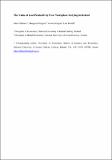| dc.contributor.author | Cullinan, John | |
| dc.contributor.author | Hodgins, Margaret | |
| dc.contributor.author | Hogan, Victoria | |
| dc.contributor.author | Pursell, Lisa | |
| dc.date.accessioned | 2020-05-25T14:14:32Z | |
| dc.date.issued | 2020-05-18 | |
| dc.identifier.citation | Cullinan, J, Hodgins, M, Hogan, V, & Pursell, L. (2020). The value of lost productivity from workplace bullying in Ireland. Occupational Medicine. doi:10.1093/occmed/kqaa067 | en_IE |
| dc.identifier.issn | 1471-8405 | |
| dc.identifier.uri | http://hdl.handle.net/10379/15991 | |
| dc.description.abstract | Background
Workplace bullying is a pervasive problem with significant personal, social and economic costs. Estimates of the resulting lost productivity provide an important societal perspective on the impact of the problem. Understanding where these economic costs fall is relevant for policy.
Aims
We estimated the value of lost productivity to the economy from workplace bullying in the public and private sectors in Ireland.
Methods
We used nationally representative survey data and multivariable negative binomial regression to estimate the independent effect of workplace bullying on days absent from work. We applied the human capital approach to derive an estimate of the annual value of lost productivity due to bullying by sector and overall, in 2017.
Results
Bullying was independently associated with an extra 1.00 (95% CI: 0.38–1.62) days absent from work over a 4-week period. This differed for public and private sector employees: 0.69 (95% CI: −0.12 to 1.50) versus 1.45 (95% CI: 0.50–2.40) days respectively. Applying official data, we estimated the associated annual value of lost productivity to be €51.8 million in the public sector, €187.6 million in the private sector and €239.3 million overall.
Conclusions
The economic value of lost productivity from workplace bullying in Ireland is significant. Although bullying is more prevalent in the public sector, it has a larger effect on absence in the private sector. Given this, along with the greater overall share of employees, productivity losses from bullying are considerably larger in the private sector in Ireland. | en_IE |
| dc.format | application/pdf | en_IE |
| dc.language.iso | en | en_IE |
| dc.publisher | Oxford University Press (OUP) | en_IE |
| dc.relation.ispartof | Occupational Medicine | en |
| dc.rights | Attribution-NonCommercial-NoDerivs 3.0 Ireland | |
| dc.rights.uri | https://creativecommons.org/licenses/by-nc-nd/3.0/ie/ | |
| dc.subject | Economic costs | en_IE |
| dc.subject | lost productivity | en_IE |
| dc.subject | workplace bullying | en_IE |
| dc.subject | ireland | en_IE |
| dc.subject | private sector | en_IE |
| dc.subject | public sector | en_IE |
| dc.subject | workplace | en_IE |
| dc.subject | economics | en_IE |
| dc.subject | bullying | en_IE |
| dc.subject | employee | en_IE |
| dc.title | The value of lost productivity from workplace bullying in Ireland | en_IE |
| dc.type | Article | en_IE |
| dc.date.updated | 2020-05-25T13:54:01Z | |
| dc.identifier.doi | 10.1093/occmed/kqaa067 | |
| dc.local.publishedsource | https://doi.org/10.1093/occmed/kqaa067 | en_IE |
| dc.description.peer-reviewed | peer-reviewed | |
| dc.description.embargo | 2021-05-18 | |
| dc.internal.rssid | 20480503 | |
| dc.local.contact | Margaret Hodgins, Ctr For Health Promotion Studies, Aras Moyola, Nui Galway. 3349 Email: margaret.hodgins@nuigalway.ie | |
| dc.local.copyrightchecked | Yes | |
| dc.local.version | ACCEPTED | |
| nui.item.downloads | 214 | |


